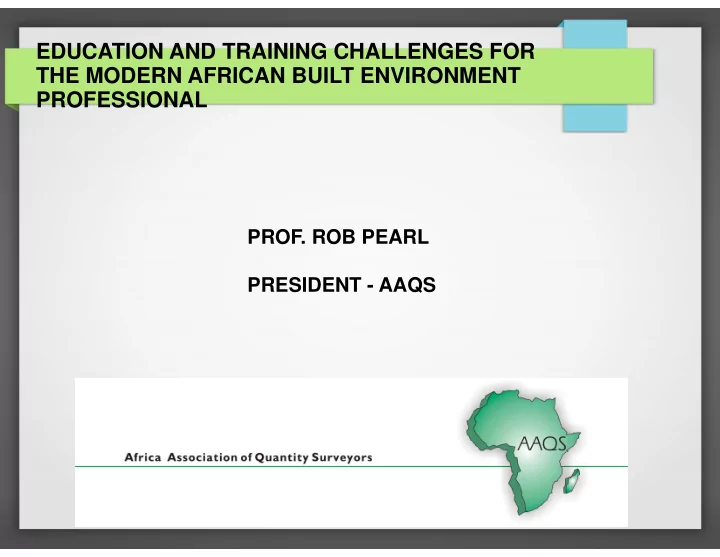

EDUCATION AND TRAINING CHALLENGES FOR THE MODERN AFRICAN BUILT ENVIRONMENT PROFESSIONAL PROF. ROB PEARL PRESIDENT - AAQS
Body of Theory A professional is required to demonstrate judgement, based on expert knowledge which is ‘owned’ by those practicing the discipline
Professionalism “A dignified occupation espousing three fundamental attributes - • knowledge • organisation • ethics of professional service” Kimball (1992)
Reflective Practice The cultivation of the capacity to reflect in action (while doing something) and on action ( after you have done it) is an important feature of professional development
So what is ‘Learning’ ? A relatively permanent change in behaviour that results from practice - Atkinson et al , 1993
It is what we think we know already that often prevents us from learning - Claude Bernard
Clients’ satisfaction with services rendered by design team members Satisfied Dissatisfied Client satisfaction with 50% 50% Architect Client satisfaction with 76% 24% Quantity Surveyor “Clients perceive the profession to be delivering an inferior service”…….Association of SA Quantity Surveyors (1990)
Typical Learning Cycles
What I hear, I forget; what I see, I remember, what I do, I understand - Chinese Proverb We learn to do neither by thinking nor by doing; we learn to do by thinking about what we are doing - George Stoddard
Typical Learning Cycle
Reflection upon a faltering BE educational system 1. Historical development of educational system 2. Contextualisation in terms of societal developments 3. Proliferation of educational and training facilities 4. Preparedness of students for tertiary education 5. Adequacy of university lecturers 6. Quality and standards at tertiary institutions 7. Profession requirements 8. Professional oversight of tertiary education 9. Accreditation of courses and graduates 10. International Reciprocity of qualifications
Historical development of educational system Technical colleges Pupilage and articled clerks Part-time university courses Fulltime university courses Technikons / Universities of Technology
Contextualisation in terms of societal developments Privilege and social advantage Closing the gap between the ‘rich’ and the ‘poor’ Skewed influence of political influence
Proliferation of educational and training facilities ‘Traditional’ Universities Transition from colonial base Distance learning initiatives Private universities / Professional academies
Preparedness of students for tertiary education SA fragmented schooling system during Apartheid Developments in schooling since 1994: rural / urban Declining standards in literacy and numeracy
Adequacy of university lecturers Who is equipped to teach? Over- concentration on doctoral studies Professorial appointments often not appropriate Lowering of standards for educators
Quality and standards at tertiary institutions Fixed facilities Research / conferences / international publications Low pass marks and expectations Declining finances
Professional oversight of tertiary education Requirements for formal recognition nationally Primary tertiary qualification / RPL In-training period and mentoring APC / TPC
Accreditation of courses and graduates Accreditation Policy Experienced / qualified accreditors The accreditation process Evaluation procedures and transparent publications
International reciprocity of qualifications Continued validity of benchmarks from the past? Fraudulent activities in qualifications Move to assessment of individual ability? Anticipated problems such as ‘gatekeeping’
Adopting a new strategy A ‘sick’ Strategic Reflection industry Planning Develop unique body of Active learning knowledge A learned ‘Profession’
Questions for Consideration Are we a ‘healthy’ profession ? No – plenty of evidence We seem to be content in Do we know the truth about our our ignorance performance ? Or are we merely Do we want the profession to ‘grow’ interested in our own in perpetuity ? selfish individual prosperity ?
The $64 000 Question What is our plan to ensure the future ‘health’ of the professions ?
THANK YOU FOR YOUR ATTENTION PROF. ROB PEARL IMMEDIATE PAST PRESIDENT - AAQS
Recommend
More recommend